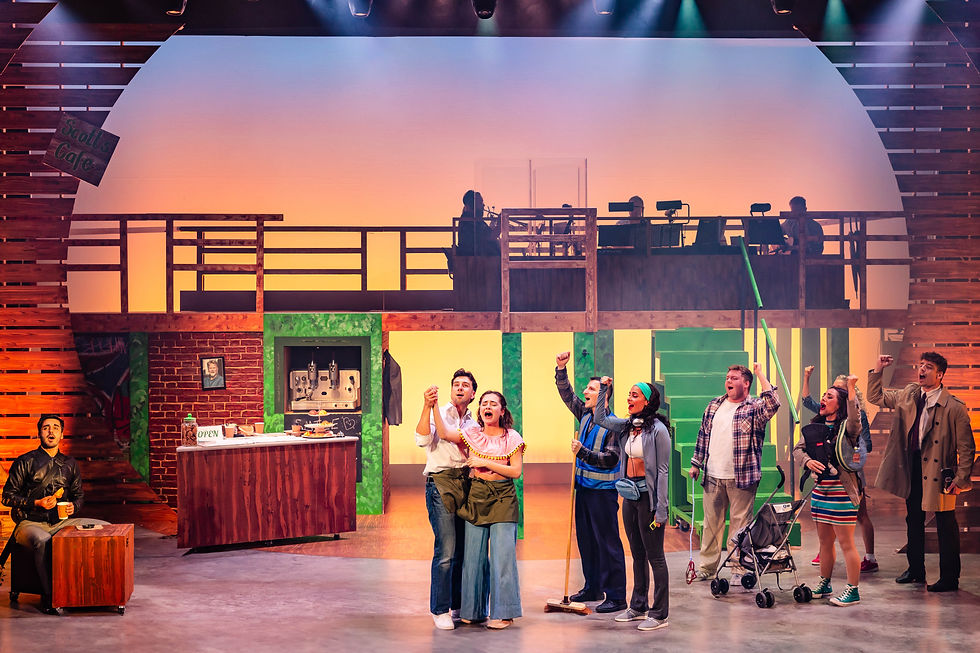Barista, which is written by Nigel and Anna Newman and directed by Sarah Redmond, is a musical about dreams, sacrifice, hope, secrets and love. The musical is ambitious in what it aims to achieve, yet fails to entice audiences in its original aura.
The musical follows the young Isabella Sanchez (Sara Bartos) as she moves from Columbia to London after winning a scholarship to university. She soon meets Andy Scott (George Crawford), a young entrepreneur and cafe owner, and the two fall in love. Whilst Andy has big dreams for their future, Isabella's haunting past catches up with their present. Long buried family secrets and betrayals resurface and threaten to destroy Isabella's new life in London.
However, the execution of this story is deeply flawed. Despite Isabella being the protagonist, she feels underdeveloped as a character, merely existing to connect the vastly different two worlds together in a rather loose plot. With no mention of her own aspirations, or even what her scholarship was in, she latches onto Andy, who ironically feels like the unintentional protagonist.
The pacing of the writing is peculiar, with the three-year development of the core romantic relationship between Isabella and Andy encompassed in a very vague manner during the opening number, yet Isabella's welcome home party celebrations drag on, with little said to advance the plot. Key pieces of information and exposition are revealed through jarring tonal shifts with flashback scenes to Isabella's parents and her childhood in Columbia between 1986 and 1994, interspersed between a more relaxed present day in London 2009.

The sharp shift of scene and timelines could be overlooked if the play didn't lean into borderline offensive stereotypes of Columbians. The lack of development of Isabella's mother (Charlotte Chalkey), father (Marc Serratosa), the villainous Matias (Jay Faisca) and his lackey Vanessa (Laura Tyrer) further enhances the lack of conviction in this plotline. In an exaggerated and poorly executed Telenovela style story (can be loosely likened to TV drama series), the far fetched twists and obstacles seem unnecessarily drastic and loses the audience. Additionally, an unnecessary slur makes the musical feel as though the musical crosses unnecessary lines.
The cast do the best with what they've been given, with Daley, Lobo and Crawford in particular delivering standout and excellent performances. Crawford is a woefully underused performer, yet still manages to steal the show with his performance. Crawford's earnest performance, both to fulfil his dream and to win Isabella work, makes for an engaging watch, and often more of a worthwhile investment than the external drama. Crawford is rightfully given a few solos, yet it's his solo in Act One I Can Feel The Sun that becomes the show-stopping number. Approaching the piece with a more subtle style, Crawford is a welcomed presence that I wish the musical featured more.
Daley takes the audience by a delightful surprise as Sue, a regular customer at the Cafe, providing the musical with its much needed heart and humour. Between her dazzling solo number Smoothie Man, which incredulously received a partial standing ovation, and her warmth, wisdom and wit, Sue is the show's most (and possibly only) likeable character.
Lobo does well to portray the guilt ridden, vengeful and emotionally tortured Luis Sanchez (Isabella's brother) and shows off his own excellent vocals in Lion Waits and The Argument. Bartos as Isabella has a strong stage presence, commanding vocals and is clearly a very capable performer, yet the material doesn't quite utilise her talents, choosing instead to treat her character as an afterthought. Bartos is lovely to watch, yet Isabella feels unmotivated without her own clear motive or even identity, primarily reacting to new obstacles and doing little to take action. However her Act One closing number Stronger is aptly one of the show's strongest moments.

The ensemble work wonderfully together, albeit questionably portraying both Columbian and British characters. Choreographer Pasha Kovalev uses this vastly talented ensemble to create stunning and incredible dances that beats life into the musical, adding flavour whenever necessary. From impressive contemporary numbers, to fierce Columbian dances, the choreography pulsates throughout, and leaves the audience mesmerised.
The staging (Lily Caccia) is done well, with the cafe tucked into half the stage with its own steamy coffee machine and friendly counter. A movable staircase helps access the upper tier of the stage, where the band are present throughout. The use of multi-tiered staging helps differentiate between scenes and characters, and with a wooden circular wings on either side, the entire stage is framed in wood. Scenes with video projections along the edge of the set helpfully pinpoint the location and time period, along with videos of gloomy or sunny weather.
The costumes (Caccia) also provide colourful and distinctive personalities to the characters. These are particularly spectacular for the ensemble during dance numbers, with fake mustaches and suits, or the flowy bright coloured skirts and scarves. The lighting design is gorgeous (Jack Weir), using a warm glow to help differentiate countries, and create a splintered raining effect during a particular number. Music Director Patrick Rufey and the band do a great job with the score by The Newmans, blending more traditional Spanish styles and instruments alongside the more traditional musical theatre numbers.
Barista is a musical that with a lot of reworking could be successful and popular show. It's compromised of several great ingredients, yet hasn't quite found the right recipe. It is currently playing at The Capitol Theatre in Horsham until 21st September. For tickets and more information, you can follow the link here.
⭐️⭐️ (2*)
Gifted tickets in return for an honest review | photography by Danny Kaan
Commentaires